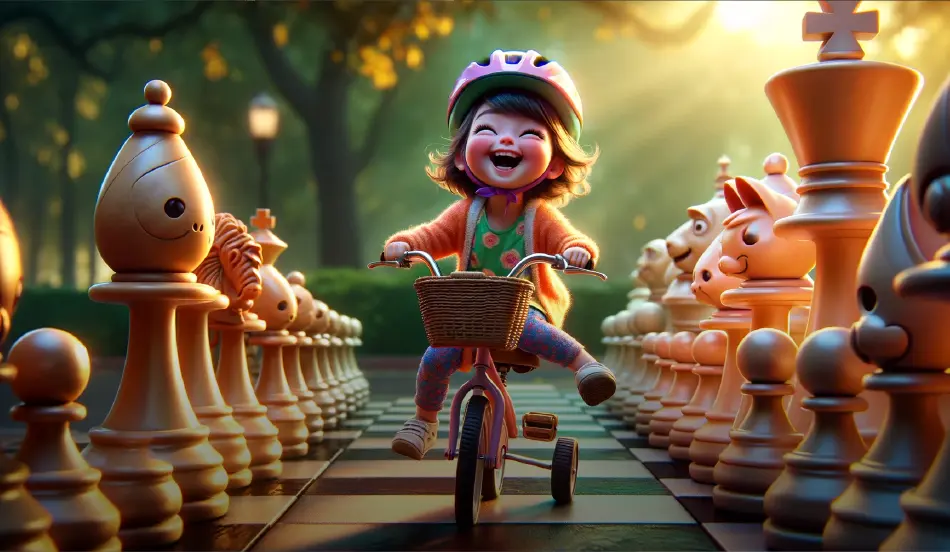Wobble Your Way: Advance in Chess Without Knowing it All
Adopt the “wobbling mindset” to break free from the fear of not knowing everything in chess and improve through practice.
Adopt the “wobbling mindset” to break free from the fear of not knowing everything in chess and improve through practice.

The Wright brothers ran a bicycle shop. People love to ride bicycles. The U.S. government was spending $2 million to get a plane in the air. The Wright brothers (from their tiny bike shop) were racing against the wealthy U.S. government to create a plane that would fly.
Who would fly first?
The government was convinced that a plane had to fly straight or it would crash. No turbulence. Zero imperfections, or else it would fail. The Wright brothers thought this also.
Until one day… they looked at a little kid learning to ride a bike.
He jumped on the bike and took off. He wobbled for a few seconds, and every turn he wobbled again, but soon he was off and gone. He was riding a bike.
He wobbled!
They made a plane that wobbled. The plane flew. They made history.
They beat out a government that was spending millions.

Source: historycollection.com
***
I read the above in James Altucher’s “Skip the Line.”
And it enlightened me.
This is exactly what many chess lovers do with their openings and their chess improvement. They try to be perfect before actually going forward, before trying.
It’s rare for me to get zero points in a match. I get at least one point. But not this time. Not against this guy.
During our one-on-one calls, I met a guy who said against 1.d4 his main opening is the King’s Indian, but he doesn’t yet feel comfortable in the resulting positions.
When I recommended that he read a few books on the King’s Indian, he surprised me by saying he has read all of them.
Then I asked him to send me his games, and positions where he felt uncomfortable.
This time, he didn’t surprise me. He shocked me.
“I haven’t played it yet.”
He went further to explain to me that he wanted to study 7(!) King’s Indian books before playing it.
In confusion, I asked him what he plays now against 1.d4 before he learns King’s Indian.
He sent me into knockdown for a second time.
“I haven’t played chess for 2 years.” He continued, “I decided to go backward, polish all my openings for White and Black, finish my list of 50 books, and then I’ll be ready.”
When I recovered from this second knockdown, he gave me the final punch.
“We have a close group of about 100 people. We agreed not to play chess for 4 years, and we keep each other accountable and study together.”
0-3. The referee stopped the show because of a technical knockout.
In the article “How to Get Better at chess: The 3-step Formula and the Secret Sauce”, I described the study-practice-fix approach, which is required in improving every field of your life.

But often, we fear the 2nd step - the Practice.
Why?
There is going to be feedback.
Nobody ever tells you, “Oh, how you train so well.” Or “You did a great job reading that book.”
Nobody ever compliments you about “How carefully you analyze your games and fix your mistakes, Bravo!”
But when we practice, when we play chess, we’re going to hear a lot of feedback.
And it can be without words. It can be how our opponents look at us, and at our moves. Our rating will talk without talking. Or our ego will yell at us from inside.
Do we freeze and let fear stop us?
Or do we take a step, we wobble, and we wobble again, and then again, until we fly?
We have a choice 😊
If you’ve read our story, you know that I was scared when I started ChessMood.
What if my, “I can make work anything I want to” belief doesn’t work this time?
What if becoming a Grandmaster and a Poker Pro is much different from starting and being successful in business? I had no idea then what CEO means, or what shares are, and I had no idea about how to run a business.
Should I learn everything and read every business book, before starting it?
I was scared when I recorded my first course
Oh, my English. My accent. What if people laugh?
Maybe I should improve my English first?
Or maybe before recording the first course, I should record random stuff for a few months?
I was scared when I started to write
I had already written many articles. Our Blog page was ready and waiting for my “let’s go.”
But I was scared. What if I get comments and messages saying that I better just record and never write again?
I was scared at everything I started. Every time before publishing an article, a course, or a feature, I was concerned about people liking it.
And I’m scared right now.
What if someone leaves in the comment to this article, “Go wobble yourself. This was an awful article.”
I should confess I have another inside scared “warm.”
I’m about to publish my first book.
What if all those hours I put in are worthless? What if nobody reads it?
Maybe I should go backward and study more about writing?
Maybe…
But then I recall where I am now.
And how I learned everything so fast.
Just by 3 steps: Study-Practice-Fix, and…
By wobbling! By filling the gap between perfection and fear.

I know our ChessMood openings to a deep degree of depth.
I know nuances that can occur on move 25.
I have conducted huge-huge-huge analysis in every variation. I have extensive experience with this.
But at first… 😊
I had just small files on every opening, and I knew a few ideas in each of them. Just enough to start. To start wobbling.
I would play. Then, fix my mistakes. Then, my files would become bigger, and I would know a few more ideas.
Then I discovered new ideas. Some novelties.
Then I recorded courses on them.
I didn’t stop. I continued playing, and fixing. Analyzing and updating the files. Checking out students' games, finding more practical variations, playing them, testing them, and polishing them.
I wasn’t an expert in 1.e4.
I had played 1.d4 all of my life.
But I wobbled. A lot!
Before I became an expert in 1.e4, too.
Remember my horrible game from the “The Risks of Playing Chess When You don't Want to” article?
I played 1.e4 e5 2.Bc4 and got a lost position in 10 moves.

I’m experimenting with 2.Bc4 to see if it’s practical enough that I can add an alternative repertoire to our Scotch.
Do I analyze every variation? Do I read every book about and watch every game before practicing it?
Nope. I’m wobbling. I’m not afraid to shamelessly lose games, if…I learn.
I have a contract with my ego. Each time I lose/fail at something and it wants to tell me something, if I say, “I just learned x thing”, it shuts up.
And together, we keep wobbling, and wobbling, and even more wobbling. Until suddenly, we realize that we are flying.
With best wishes,
GM Avetik
P. S. As always feel free to share your thoughts and what do you take to your journey from this article here.
P. P. S. If you’re not a ChessMood student yet, I have three gifts for you:
1. Opening Principles - The fundamentals and beyond in detail
3. GM Gabuzyan’s 10 best games
You can watch all three courses for free, by creating a basic account here.
(Takes a few seconds)
Originally published Jan 23, 2024

